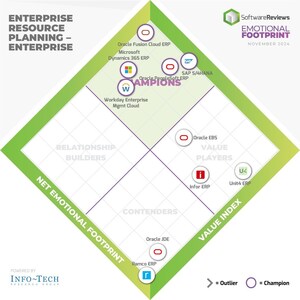The firm's latest research highlights the urgent need for insurance companies to shift from complex, costly legacy systems burdened with outdated technology to modern solutions for a competitive edge in the current market.
TORONTO, Oct. 3, 2023 /PRNewswire/ - In the ever-evolving and dynamic landscape of the insurance industry, agility and adaptability have never been more crucial to maintaining a competitive edge and a strong market presence. Escalating customer dissatisfaction with outdated engagement strategies is driving a shift, with modern consumers demanding innovative and advanced solutions that many legacy systems cannot deliver. This gap is leading insurers to lose substantial ground to more agile competitors who are quicker to identify and exploit market opportunities, making speed to market an essential factor for success. To address these challenges, Info-Tech Research Group has released its latest research, Insurance Core Systems Modernization, a comprehensive blueprint designed to assist insurance companies in overcoming the significant barriers they face while modernizing their technology systems.
"The insurance industry is highly regulated and continues to add more complex requirements, placing pressure on traditional insurers as compliance requirements constantly shift," says Ahmed Mapara, principal research director at Info-Tech Research Group. "Insurance companies must navigate these complex and often conflicting regulatory frameworks across different jurisdictions. New regulatory requirements related to data privacy and security may emerge, which would require significant changes to existing policies and procedures. Startups classified as insurtech and nontraditional insurers in the market are not always subject to the same level of regulatory oversight."
Info-Tech's research explains that the legacy systems in use by numerous insurance companies are complex and expensive to maintain due to outdated hardware, software, and development practices. The situation is further complicated by a rapidly shrinking pool of developers skilled in older programming languages, leading to increased reliance on third-party support or outsourcing. The firm advises that this set of circumstances necessitates an urgent shift from these legacy systems to platforms that can meet today's customer-centric demands and tomorrow's data-intensive needs. The persistent reliance on legacy systems is costly and can consume a substantial portion of an organization's budget, further emphasizing the critical need for immediate modernization within the insurance sector.
"The pace of digital transformation is likely to accelerate in the coming years," explains Mapara. "Legacy technologies have become the elephant in the room, and insurance firms must keep pace with new technologies to remain competitive. Implementing automation, artificial intelligence (AI), and emerging technologies such as the Internet of Things (IoT) and blockchain may require significant changes to the existing model."
The new blueprint from Info-Tech emphasizes the need for future-oriented technology investments within the insurance sector. Adapting to both market shifts and the core requirements that stem from evolving customer experiences is paramount. When embarking on the journey to upgrade legacy systems, the firm recommends that IT leaders in the insurance industry should prioritize the following critical areas:
- Business Processes: Insurers must drastically improve business processes and services to meet client needs. Effective processes will give firms a competitive advantage.
- Speed to Market: To keep up with customer expectations, insurers constantly need new products. Digital transformation will create agile platforms to drive customer satisfaction.
- Risk Mitigation: Legacy systems continue to eat at insurer budgets with high maintenance costs, raising questions about their long-term sustainability and the risk they pose to firms.
- Increased Efficiency: Outdated platforms are unable to provide the agility and efficiency needed for modern insurance products and services.
- Data-Centric: Data defines the future of insurance companies and their products and services. Data silos created through legacy systems jeopardize insurance companies' growth and existence.
Modern systems within the insurance industry are not merely about improving profitability and customer experience. These systems pave the way for innovative growth through the application of modern technological solutions and can expedite underwriting decisions and claims handling, leading to a new era of profit-driven automation. Furthermore, they can play a pivotal role in curtailing fraud, ensuring accurate and consistent decision making backed by well-designed business processes.
To learn more about modernizing technology in the insurance industry to stay competitive in this digital era, download the complete Insurance Core Systems Modernization blueprint.
For media inquiries on the topic or to get exclusive, timely commentary from Ahmed Mapara, an expert in financial services, please contact [email protected].
For information about Info-Tech Research Group or to access the latest research, visit infotech.com and connect via LinkedIn and X.
Info-Tech Research Group is one of the world's leading information technology research and advisory firms, proudly serving over 30,000 IT professionals. The company produces unbiased and highly relevant research to help CIOs and IT leaders make strategic, timely, and well-informed decisions. For 25 years, Info-Tech has partnered closely with IT teams to provide them with everything they need, from actionable tools to analyst guidance, ensuring they deliver measurable results for their organizations.
Media professionals can register for unrestricted access to research across IT, HR, and software and over 200 IT and industry analysts through the firm's Media Insiders program. To gain access, contact [email protected].
SOURCE Info-Tech Research Group

WANT YOUR COMPANY'S NEWS FEATURED ON PRNEWSWIRE.COM?
Newsrooms &
Influencers
Digital Media
Outlets
Journalists
Opted In






Share this article